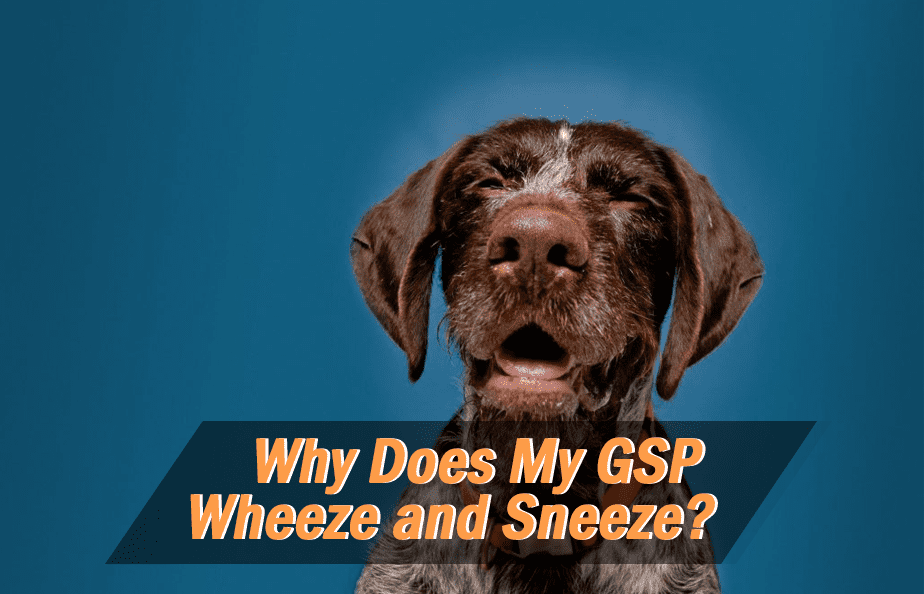Do you have a German Shorthair Pointer that wheezes and sneezes at home? If yes, then how long has it been? Is your GSP having difficulty in breathing?
One of the most important organs of a GSP is its nose! The nose helps them track blood, track deer and retrieve big game. But, the same organ may cause serious health problems if proper care is not taken.
For example, GSPs are known to have dry noses, which can be due to several underlying conditions. But, if your GSP is sneezing or wheezing continuously, then you need to get it checked immediately!
Wheezing and sneezing are very common in dogs, as it is in humans. It can be for many reasons that can be as simple as sniffing something that tickles the nose. But, when it is persistent, it can be due to something more serious.
So, here are a few questions I’ll answer in this article:
- Why does my GSP wheeze and sneeze?
- What should I do if my GSP is wheezing and sneezing?
- My GSP sneezes and wheezes a lot. How do I prevent this?
Your German Shorthair Pointer is likely to wheeze and sneeze if it has sniffed or inhaled something it is allergic to or has an infection in the lungs. It can also cause your GSP to have an asthma attack if something in the environment triggers it.

What is causing my GSP to wheeze and sneeze?
Like humans, dogs are prone to catching a cold and may sneeze and even wheeze in the cold. Most of the time, the sneezing is accompanied by a runny nose and a cough. Wheezing and sneezing in dogs can occur at any time and are commonly seen during winters.
Also, GSPs are prone to catching a cold because they don’t tolerate low temperatures well, and they are mostly suited for moderate temperatures inclining more towards warmer conditions. Hence, if you live in colder regions, then your GSP most likely got a cold.
But, if you’ve noticed your GSP wheeze and sneeze relentlessly, then it could be because of the underlying reasons:
Allergies
Allergies are quite common in dogs and are mostly seasonal. The high accumulation of pollen in the air during spring can cause your GSP to wheeze if they are allergic to it. Other allergens such as dust, mites, or even cigarette smoke are potential allergens for GSPs and can cause wheezing and sneezing.
These small particles enter the airways/ windpipe and block the passage causing the linings to inflame. Such a condition will cause your GSP to wheeze or sneeze, and it may have difficulty breathing.
Collapsing trachea or bronchitis
Collapsing trachea is mostly seen in senior GSPs. The trachea has a flexible membrane and opens and closes as the dog breathes. But, in a few cases, the trachea may collapse on itself and narrow the airway; thus, the dog may have difficulty breathing.
In such a case, your GSP will let out a wheeze or sneeze as it is gasping for more oxygen. In the case of bronchitis, there is inflammation of the lower airways in a dog’s lungs, and swelling narrows the airways and restricts the smooth flow of air, causing the dog to wheeze.
The condition is usually accompanied by coughing; in serious cases, your GSP will wheeze when it exhales.
Kennel cough
Kennel cough is a respiratory disease mainly caused by a bacterial infection in the respiratory tract. The first common symptoms include coughing and retching, eventually leading to wheezing and sneezing if the condition worsens.
Infectious disease
A nasal mite is an infectious parasite commonly seen in dogs that is easily transferable. Dogs can carry nasal mites for years, and you will notice wheezing and sneezing when the dog is super excited.
These parasites can enter the airways and cause lung infections, leading to other secondary infections.
Heartworms, roundworms, or hookworms can also cause wheezing and sneezing in GSPs.
Heart disease
Dogs with heart valve disease can experience continuous wheezing due to fluid build-up in the lungs. This condition is commonly seen in older dogs.
Asthma
It may surprise you, but asthma is also commonly seen in dogs as in humans. It is also known as allergic bronchitis and is usually triggered by an allergen in the surroundings. The allergens can be cigarette smoke, air freshener, or any smoke or dust in the air.
What can I do if my GSP is wheezing and sneezing?
If your GSPs wheeze and sneeze don’t last, then it is fine to simply keep an eye on it. But it’s going on for hours, then first check if there’s any foreign body inside the nose or the throat. If so, try to remove the foreign object stuck inside or take your GSP to a vet.
You must take the condition seriously if your GSP is a senior dog or a puppy.
How do I prevent my GSP from wheezing and sneezing?
A GSP must be kept away from any potential allergens, such as places with a lot of pollen in the air or areas with a lot of smoke and dust. You must not give access to small toys or objects that can get stuck in their throats.
A good preventive method is to get your GSP to a vet for an allergic test when they are only puppies. Such a step will help you prevent any serious illness in your GSP.
Conclusion
A wheezing and sneezing German Shorthair Pointer is a common sight, but don’t let it last for long. Such symptoms may be due to an underlying health condition that needs an immediate check-up.
Sneezing may be common in winter, but you must keep your GSP warm to avoid further complications. GSPs are generally healthy dogs, but regular visits to the vet will ensure that they are in optimum health.
